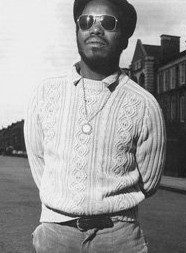


NEWS:
11 shows for December including a new DJ - plus 2025 Festive 50 arriving from Christmas day.
Artist Info
|
Delroy Wilson  Image from Discogs  Delroy Wilson OD (5 October 1948 – 6 March 1995) was a Jamaican Ska, Rocksteady, Reggae singer. Delroy Wilson OD (5 October 1948 – 6 March 1995) was a Jamaican Ska, Rocksteady, Reggae singer.Born in Trench Town, Kingston, Jamaica, Wilson released his first single "Emy Lou" in 1961 for record producer, Clement "Coxsone" Dodd, at the age of thirteen. His early years with Coxsone yielded a number of ska hits, the biggest of which, the Lee Perry-written "Joe Liges" was an attack on rival producer and former Dodd employee Prince Buster. This was followed by another Perry-written attack on Buster, "Spit in the Sky". Further singles followed, including "One Two Three", "I Shall Not Remove", "Look Who Is Back Again" (a duet with Slim Smith), and another anti-Buster song, "Prince Pharaoh", notably the only record featuring the voice of Dodd himself. His voice matured as he left his teens, around the time of ska's transition to rocksteady and this period in the late 1960s produced many hits including one of the first rocksteady records, "Dancing Mood", "Jerk in Time" (with the Wailers), "Feel Good All Over", "I'm Not a King", "True Believer in Love", "Rain From the Skies", "Conquer Me" and "Riding For A Fall". "Won't You Come Home", a duet with Ken Boothe on a rhythm originally cut by The Conquerors for Sonia Pottinger has become one of the most-versioned Jamaican tracks ever.[citation needed] After leaving Studio One he recorded for numerous other producers, with varying degrees of success, and set up his own short-lived W&C label along with Wilburn Cole, and the similarly-fated Links label with Ken Boothe, The Gaylads and The Melodians. He enjoyed success with Bunny Lee in the late 1960s and early 1970s with tracks such as "This Old Heart of Mine", "Footsteps of Another Man", and "Better Must Come". His double A-side "It Hurts"/"Put Yourself in My Place" was a skinhead favourite and narrowly missed UK chart success. He recorded a version of "Run Run", a song he had originally recorded for Dodd, for maverick producer Keith Hudson. 1970 saw Wilson's first tour of the UK, where he also recorded a number of songs for the Trojan record label. In 1972, Michael Manley's People's National Party chose Wilson's "Better Must Come" as their election campaign song. The same year saw the release of one of his most popular songs, "Cool Operator", which became his nickname. He worked with a string of producers in the years that followed, including Joe Gibbs ("Mash Up Illiteracy", "Pretty Girl"), Gussie Clarke ("Love"), Winston "Niney" Holness ("Rascal Man"), Harry J ("Ask The Lonely"), and Joseph Hoo Kim ("It's a Shame"). In 1976, he recorded a cover of The Wailers' "I'm Still Waiting" for Lloyd Charmers, which was hugely popular, and enjoyed some cross-over success, and was followed by the album Sarge, which is considered one of his strongest. Also a Bob Andy produced song, "The Last Thing On My Mind" rose to number one in Jamaica. Wilson continued the run of success until the end of the decade, but his career floundered during the early 1980s, with releases less common. His fortunes revived in the digital age with releases for King Jammy ("Don't Put The Blame On Me") and Bunny Lee ("Ease Up"), with new albums following, but he again drifted out of the limelight, with his health declining, and is best remembered for his earlier work. In 1994, Wilson's enduring legacy to Jamaican music was recognized by a special plaque awarded him by the Jamaican government, and presented by the then Prime Minister, Patterson. Delroy Wilson died on 6 March 1995 at Kingston's UWI hospital, of complications from cirrhosis of the liver. He was 46 years old. Delroy is referenced by The Clash, in "(White Man) In Hammersmith Palais". In 2013 Wilson was posthumously awarded the Order of Distinction by the Jamaican Government. In the 1960s he sang duo with Paulette Williams as Delroy & Paulette. He was not a part of the duo Higgs and Wilson with Joe Higgs and Roy Wilson(no relation) He released his first solo single "If I Had a Beautiful Baby" in 1962 for record producer, Clement "Coxsone" Dodd, at the age of thirteen. His follow-up single "Joe Liges" was written by Lee Perry, then working as a talent spotter/songwriter/singer for Dodd, and was a lyrical attack on former Coxsone employee and now rival, Prince Buster. The record was so popular that his follow-up, "Spit In The Sky", another Perry penned barb aimed at the Prince, was actually credited to Joe Liges when it was released in th UK on the Bluebeat and Black Swan labels. Delroy's transition to rocksteady in the late 1960s produced many hits including "Conquer Me" and "Riding For A Fall". His classic song "Dancing Mood" remains one of the most popular Jamaican songs from that time. In 1972, Jamaican Prime Minister Michael Manley and his People's National Party chose Wilson's "Better Must Come" as their election campaign song to increase their vote amongst the 'sufferers' in Jamaica. Also a Bob Andy produced song, "The Last Thing On My Mind" rose to number one in Jamaica. Delroy was mainly produced by Bunny Lee throughout the 1970s and continued recording into the early 90s under various producers spanning a career of 30+ years. Read more on Last.fm. User-contributed text is available under the Creative Commons By-SA License; additional terms may apply. Artist biography from last.fm Some other places to look for information: last.fm Discogs MusicBrainz |
